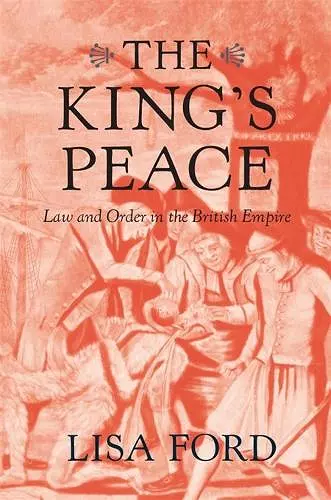The King’s Peace
Law and Order in the British Empire
Format:Hardback
Publisher:Harvard University Press
Published:10th Sep '21
Should be back in stock very soon

In The King’s Peace, Lisa Ford explores how the British Crown's response to colonial crises during the Age of Revolution undermined the rights of subjects and shaped modern governance.
During the tumultuous Age of Revolution, the British Crown faced significant crises in its colonies, prompting a forceful response that would reshape the imperial landscape. In The King’s Peace, Lisa Ford meticulously examines how the Crown's peacekeeping strategies blurred the critical distinction between lawful governance and coercive force. This transformation not only altered the nature of colonial rule but also had profound implications for the rights and identities of colonial subjects. By employing increasingly autocratic methods, colonial governors sought to maintain control across diverse regions, from North America to Jamaica and beyond.
As the British Empire grappled with the fallout from the American Revolution, the legal frameworks governing its colonies were redefined. The book highlights how representatives of the Crown imposed harsh measures that eroded the liberties once safeguarded by constitutional principles. The focus shifted from justice and individual rights to the imposition of order and obedience, marking a significant departure from the ideals established during the Glorious Revolution. Ford argues that this shift laid the groundwork for the modern police state, where the boundaries of law became increasingly malleable.
In exploring the rise of executive power and the use of arbitrary violence in colonial governance, The King’s Peace offers valuable insights into the complex interplay between peacekeeping, sovereignty, and political identity. These historical lessons resonate today, shedding light on ongoing debates surrounding the balance between security and personal freedom in contemporary society.
Finely argued…untangles the corrupted and corrupting logic of colonial peacekeeping…Outstanding in virtually every respect. -- Maxwell Carter * Wall Street Journal *
Richly researched and perceptively argued…provides a very convincing and much needed corrective to liberal narratives that have emphasized the acquisition of both personal liberty and colonial self-government in this era. -- Nancy Christie * American Historical Review *
Delivers on its claim to demonstrate a rising autocracy across the empire. This top-down story provides the perspective of British authorities. Ford is a compelling writer and each of the chapters draws on a wide range of archival and published sources…Any book that raises this many questions is certainly a valuable addition to undergraduate and graduate syllabi and is sure to generate productive historiographical conversations. -- Dana Rabin * H-Net Reviews *
Ford’s arguments are innovative, straightforward, and clear-cut, and her methodology comprehensive…Highly recommended for scholars and students interested in the history of British Empire, and more broadly, the functioning of the complicated system of colonialism. -- Haimo Li * Journal of British Studies *
[The King’s Peace] has the potential to contribute to aspects of the increasingly fractious debates on the rights and wrongs of colonialism…[and] offers an opportunity to interrogate, through a look backwards, certain arguments on the perennial difficulties all governments face when balancing, on the one hand, the needs of security and public order, and, on the other, the personal liberty of those subject to their jurisdiction. -- Venkat Iyer * Round Table *
The King’s Peace traces the British Empire’s increasingly authoritarian law and order from Boston before the American Revolution to Canada, Jamaica, India, and Australia during the first half of the nineteenth century. If making war was how Britain acquired its empire, keeping the peace, as Ford reminds us in this elegant and important book, was how the British justified their imperial persistence and rule. -- Eliga H. Gould, author of Among the Powers of the Earth: The American Revolution and the Making of a New World Empire
Examining the heart of law—the king’s peace—Ford reveals its many moods during a period when Britain’s empire covered ever more peoples in ever more fraught circumstances. By telling us wonderful stories filled with fascinating characters, she has given us a major new global legal history of an era of rapid constitutional change. -- Paul D. Halliday, author of Habeas Corpus: From England to Empire
In a wonderfully wide-ranging book, Ford argues that controversies over order and disorder not only preoccupied British officials, they also propelled reassertions of crown power, shifts to autocratic rule, legal divergences between center and periphery, and coercive peacekeeping across the empire. Powerfully argued and masterfully written, this book compels readers to grapple with the constitutional compromises made in the name of peace and good order. -- Hannah Weiss Muller, author of Subjects and Sovereign: Bonds of Belonging in the Eighteenth-Century British Empire
A persuasive and elegant study of law and governance in the British Empire from the mid-eighteenth to mid-nineteenth century. Ford examines the legal slippages which occurred as imperial officials across the empire wrestled with the challenges of suppressing crime and disorder and maintaining the social order. This book will appeal to a wide range of readers interested in the British Empire, ‘war capitalism,’ and the nature of violence in imperial expansion. -- Aaron Graham, author of Corruption, Party, and Government in Britain, 1702–1713
With global reach and local depth, this remarkable book fundamentally revises how we should understand the British Empire’s critical eighteenth-century transformations. In so doing, Ford makes a powerful argument for locating the violence that underpins modern state sovereignty not merely in its exceptions but its rule. -- Philip J. Stern, author of The Company-State: Corporate Sovereignty and the Early Modern Foundations of the British Empire in India
- Joint winner of Robert E. Dalton Award 2023 (United States)
ISBN: 9780674249073
Dimensions: unknown
Weight: unknown
336 pages